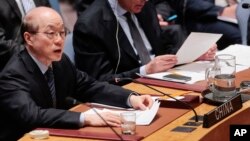China’s United Nations ambassador called Tuesday for the full implementation of existing Security Council resolutions on North Korea, while simultaneously de-escalating tensions on the Korean peninsula.
Ambassador Liu Jieyi told reporters after a closed-door emergency session on the DPRK following Sunday’s missile launch, that China and the United States are discussing possible new sanctions.
“But, of course, the measures prescribed in the previous Security Council resolutions should be implemented firmly,” Liu told reporters. “But meanwhile, we should also work to reduce tension, to de-escalate, and also to try to achieve denuclearization through dialogue by political and diplomatic means.”
The Security Council strongly condemned the May 21 launch in a statement, pledging to “take further significant measures including sanctions, in line with the council’s previously expressed determination.”
Japan’s U.N. ambassador, Koro Bessho, whose government requested Tuesday’s meeting along with the U.S. and South Korea, told reporters the launch was a “blatant violation” of existing council resolutions. “This is totally unacceptable and Japan strongly condemns this launch,” Bessho added.
Keeping pressure on
“We are talking with our friends – with the United States obviously, and ROK [South Korea], and with our close neighbors China and Russia – in order to make sure that the pressure is still there, is continued and even strengthened, so that North Korea will change its policy,” Bessho said.
Sunday’s missile launch was Pyongyang’s second in as many weeks and its 10th this year. South Korean analysts said the missile was fired from South Pyeongan province and traveled about 500 kilometers before landing in the Sea of Japan.
A Security Council resolution in place since 2006 prohibits North Korea from conducting nuclear tests or launching ballistic missiles. The council has imposed additional and harsher targeted sanctions on Pyongyang since then in response to repeated nuclear tests.
“The council is firmly united in rejecting the continuation of the launching of rockets by North Korea,” said council president Ambassador Elbio Rosselli of Uruguay. “We are discussing and considering different options," he told reporters, adding those discussions would continue.
Britain’s U.N. ambassador, Matthew Rycroft, said it is vital that the Security Council respond to the latest provocation quickly with “further substantive significant measures.”
“The [U.N.] Panel of Experts [on North Korea] have set out a range of specific measures which the UK would support, for instance: sanctioning key individuals, updating the record of sanctioned vessels, tightening restrictions on DPRK shipping services and clamping down further on financial transactions,” he said.





